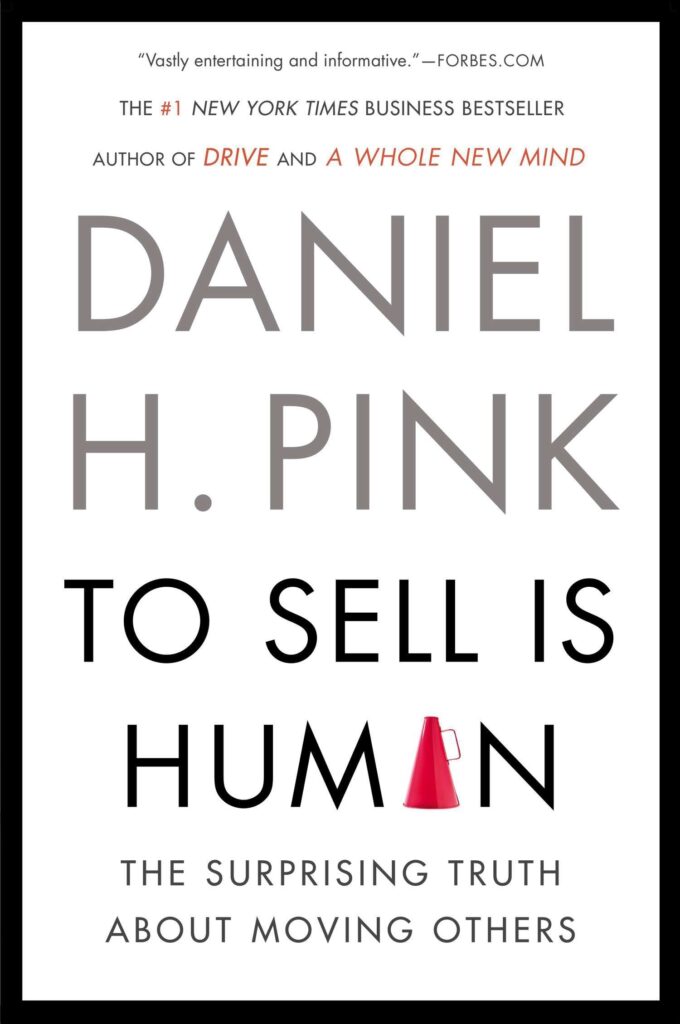
Lesson Learnt: In today’s world, we’re all involved in some form of selling. Pink introduces the “Non-Sales Selling” concept – influencing others without expecting a direct financial exchange. 3 activities at the heart of non-sales selling are:
➊ teaching, coaching, or instructing others
➋ serving clients or customers
➌ persuading or convincing others.
Instead of Always Be Closing (ABC), Pink proposes a new version of ABC – Attunement, Buoyancy, and Clarity.
.
Attunement refers to the ability to understand and connect with the needs and concerns of the customer. And perspective-taking hinges on 3 principles.
➊ There is an inverse relationship between power and perspective-taking. Having too much power can distort one’s understanding of another person’s perspective and make it more difficult to attune oneself to them. See the world through their eyes, rather than relying on one’s power and authority.
➋ Think + Feel, but Think > Feel. Perspective-taking is a cognitive capacity; it’s mostly about thinking. Empathy is an emotional response; it’s mostly about feeling. But when it comes to moving others, perspective-taking is the more effective of these fraternal twins.
➌ Mimic strategically and subtly
.
Buoyancy refers to the ability to stay optimistic, resilient and afloat in an “ocean of rejection”. The 3 components of buoyancy apply before, during, and after any effort to move others.
➊ Before: Interrogative self-talk. Positive self-talk is generally more effective than negative self-talk. But the most effective self-talk of all doesn’t merely shift emotions. It shifts linguistic categories. It moves from making statements to asking questions.
➋ During: Positivity Ratios. A healthy positivity ratio is a calibration between two competing pulls: levity and gravity. Levity is that unseen force that lifts you skyward, whereas gravity is the opposing force that pulls you earthward. When these 2 opposing forces are properly combined, they leave you buoyant.
➌ After: Having an optimistic explanatory style. A pessimistic explanatory style leads to learned helplessness
.
Clarity refers to the the capacity to help others see their situations in fresh and more revealing ways and to identify problems they didn’t realise they had.
Pink argues that in today’s world of abundant information, it is not enough to simply solve a problem that is already known to the other person. Instead, it is more valuable to help the other person identify a problem that they did not realise they had, and then provide a solution. This requires problem-finding skills, such as the ability to ask questions and curate relevant information, rather than just problem-solving skills.
Clarity depends on contrast and Pink presents 5 frames that can be useful in this regard:
➊ The Less-is-more Frame
➋ The Experience Frame
➌ The Label Frame
➍ The Blemished Frame
➎ The Potential Frame
.
Attunement, Buoyancy, and Clarity have taught you how to be. Pitch, Improvise and Serve describes what to do.
Pitch. The purpose of a pitch isn’t necessarily to move others immediately to adopt your idea. The purpose is to offer something so compelling that it begins a conversation, brings the other person in as a participant, and eventually arrives at an outcome that appeals to both of you. There’re 6 successors of the elevator pitch.
➊ The one-word pitch
➋ The questions pitch
➌ The rhyming pitch
➍ The subject-line pitch
➎ The Twitter pitch
➏ The Pixar pitch
The one-word pitch (one-word equity) Maurice Saatchi says the companies’ aim, and the aim of this type of pitch, is to define the one characteristic they most want associated with their brand around the world, and then own it. For example: Search (Google), Priceless (MasterCard), Change (Barack Obama)
The subject-line pitch. People make decisions based on 3 factors: utility, curiosity. and specificity. People are quite likely to read emails that directly affected their work. But they are also likely to open messages when they had moderate levels of uncertainty about the contents. Utility and curiosity are about equally potent, but they seem to operate independently of each other.
Improvise. The stable, simple, and certain conditions that favoured scripts have now given way to the dynamic, complex, and unpredictable conditions that favour improvisation. Beneath the apparent chaos of improvisation is a light structure that allows it to work. They are …
➊ Hear offers
➋ Say “Yes and”
➌ Make your partner looks good
The first principle of improvisation—hearing offers—hinges on attunement, leaving our own perspective to inhabit the perspective of another. Salit’s training emphasises slowing down and shutting up as the route to listening well. He also tells us to take in anything and everything someone says as an offer you can do something with. Have the ability to listen without listening FOR anything.
Serve. Sales and non-sales selling are ultimately about service. But “service” isn’t just smiling at customers. Instead, it’s a broader, deeper, and more transcendent definition of service—improving others’ lives and, in turn, improving the world. And that’s more likely to happen if we follow the two underlying principles: Make it personal and make it purposeful.
Moving from “upselling” to “upserving”. Upserving means doing more for the other person than he expects or you initially intended, taking the extra steps that transform a mundane interaction into a memorable experience. Anytime you’re tempted to upsell someone else, stop what you’re doing and upserve instead. Don’t try to increase what they can do for you. Elevate what you can do for them.
Treat everyone as you’d treat your grandmother with 80k Twitter followers. By removing the cloak of anonymity and replacing it with this form of personal connection, you’re more likely to genuinely serve, which over the long haul will redound to everyone’s benefit.
Always ask and answer these two questions
➊ If the person you’re selling to agrees to buy, will his or her life improve?
➋ When your interaction is over, will the world be a better place than when you began?
◃ Back
Buy on Amazon